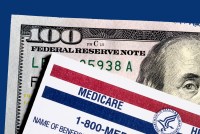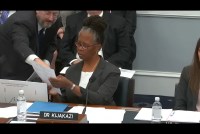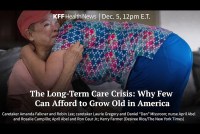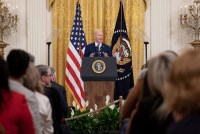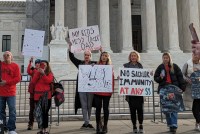Latest KFF Health News Stories
An Arm and a Leg: When Hospitals Sue Patients (Part 1)
Some hospitals sue patients over unpaid medical bills. But is this even an effective way for hospitals to recoup lost revenue? On this episode of “An Arm and a Leg,” host Dan Weissmann speaks with medical-debt experts to explore a different solution.
Millions in Opioid Settlement Funds Sit Untouched as Overdose Deaths Rise
Some states haven’t begun using opioid settlement funds intended to help curb the opioid epidemic. Meanwhile, more than 100,000 Americans died of an overdose last year.
As Foundation for ‘Excited Delirium’ Diagnosis Cracks, Fallout Spreads
Major policy changes and disavowals have made this a watershed year for curbing the use of the discredited “excited delirium” diagnosis to explain deaths in police custody. Now the ripple effects are spreading across the country into court cases, state legislation, and police training classes.
LA County Invests Big in Free Virtual Mental Health Therapy for K-12 Students
California is spending almost $5 billion to address a growing youth mental health crisis. In Los Angeles County, a contract with teletherapy provider Hazel Health is funding free therapy sessions for all interested students. School districts are grateful for the additional support, but express concerns about the remote arrangement.
People With Disabilities Hope Autonomous Vehicles Deliver Independence
A pilot project in northern Minnesota aims to pave the way for fully autonomous vehicles to offer independence for people who can’t drive.
Listen: What Our 2-Year-Long Investigation Into Medical Debt Reveals
An award-winning project by KFF Health News and NPR found that at least 100 million people in the United States are saddled with medical bills they cannot pay — and exposed a health care system that systematically pushes people into debt.
Biology, Anatomy, and Finance? More Med Students Want Business Degrees Too
A majority of medical schools now offer dual MD-MBA programs, compared with just a quarter two decades ago. The number of medical students seeking a business degree has nearly tripled. This begs the question: Whom will these doctors serve more, patients or shareholders?
Watch: She Had a Home and a Good-Paying Job. Then Illness and Debt Upended It All.
A chronic health diagnosis and medical debt reordered Sharon Woodward’s life.
Being Black and Pregnant in the Deep South Can Be a Dangerous Combination
Being Black has always been dangerous for pregnant women and infants in the South. And researchers say things are continuing to move in the wrong direction.
What the Health? From KFF Health News: Democrats See Opportunity in GOP Threats to Repeal Health Law
Sensing that Republicans are walking into a political minefield by threatening once again to repeal the Affordable Care Act, the Biden administration is looking to capitalize by rolling out a series of initiatives aimed at high drug prices and other consequences of “corporate greed in health care.” Meanwhile, the Supreme Court hears a case that could determine when and how much victims of the opioid crisis can collect from Purdue Pharma, the drug company that lied about how addictive its drug, OxyContin, really was. Alice Miranda Ollstein of Politico, Anna Edney of Bloomberg News, and Rachana Pradhan of KFF Health News join KFF Health News chief Washington correspondent Julie Rovner to discuss these issues and more. Also this week, Rovner interviews Dan Weissmann of KFF Health News’ sister podcast, “An Arm and a Leg,” about his investigation into hospitals suing their patients over unpaid bills.
Dodging the Medicare Enrollment Deadline Can Be Costly
As open enrollment ends, many people are tuning out. They could wind up with a surprise next year: higher costs and less access to health care providers.
Candidates Clashed But Avoided Talk of Abortion at 4th GOP Primary Debate
Obamacare had its moment, but not until the faceoff’s final minutes. Front-runner Donald Trump again was not on the debate stage, leaving the other Republican presidential hopefuls to slug it out to break through and gain voters’ attention.
Food Sovereignty Movement Sprouts as Bison Return to Indigenous Communities
Native American leaders see bison herds and ancestral gardens as ways to bring healthy eating to their people.
Colorado Blames Biden Team and Drugmakers for Delaying Canadian Imports
Colorado officials say they haven’t been able to stand up a program to import drugs from Canada because of drugmaker opposition — and the Biden administration’s inaction.
Social Security Clawbacks Hit a Million More People Than Agency Chief Told Congress
More than 2 million people a year have been sent notices that Social Security overpaid them and demanding they repay the money. That’s twice as many as the head of Social Security disclosed at a congressional hearing in October.
Watch: The Long-Term Care Crisis: Why Few Can Afford to Grow Old in America
Long-term care options in the U.S. are costly, complex, and often inadequate. KFF Health News’ Jordan Rau and Reed Abelson of The New York Times host a Zoom panel to explore the challenges of providing — and affording — care.
Readers Slam Hospital Monopolies and Blame the Feds for Understaffed Nursing Homes
KFF Health News gives readers a chance to comment on a recent batch of stories.
Biden Wants States to Ensure Obamacare Plans Cover Enough Doctors and Hospitals
The regulatory proposal was announced Nov. 15 and is likely one of the last major ACA policy efforts of the president’s first term.
These Programs Put Unused Prescription Drugs in the Hands of Patients in Need
States and counties look to expand programs that accept donations of unused surplus drugs from places like nursing homes and hospitals and redistribute them to low-income and uninsured residents.
Watch and Listen: Opioid Settlement Case Triggers Protests Outside the High Court
The Supreme Court heard arguments over whether the Sacklers, the family behind Purdue Pharma — which marketed OxyContin — could claim immunity from future lawsuits without claiming bankruptcy.













